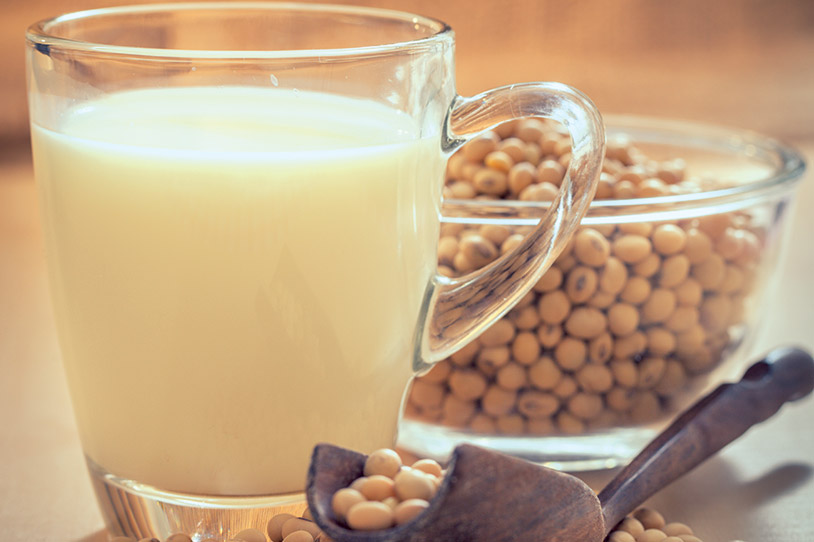Advertisement
Beyond Cows’ Milk
6 healthy alternatives

Whether you can’t handle lactose, are looking to avoid animal-derived products, or just want a change, there is a milk alternative to fit every need. For optimal health benefits, choose unsweetened varieties.
Advertisement
Soy
From soy milk lattes to soy milk ice cream, this healthy milk alternative can be found just about anywhere cows’ milk is. With many benefits, soy milk’s popularity isn’t surprising.
Studies have found that whole soy foods including soy milk may promote good health by keeping cholesterol levels in check, increasing bone mineral density, and easing menopausal symptoms.
The abundance of isoflavones (a type of estrogen-like plant compound) found in soy is often credited with soy’s multitude of health benefits. However, isoflavones appear to have both beneficial and adverse effects on certain types of cancer risk. Research is ongoing.
Containing about 6 to 8 g of protein per cup (250 mL), soy milk is the only plant-derived milk that can compete with cows’ milk in terms of protein content. As soy protein contains all essential amino acids, it is one of the few plant-based sources of complete protein.
Soy milk is also a source of many minerals including selenium, copper, and magnesium. It contains some calcium, though not always as much as cows’ milk.
Good choice for:
lactose-intolerant individuals, children over two years old, those with nut or milk allergies, ovovegetarians, and vegans
Advertisement
Hemp
Made from the seeds of the hemp plant, hemp milk has a distinctive nutty taste and creamy texture.
Like soy, the protein found in hemp milk contains all essential amino acids, making it a decent plant-based source of complete protein.
Hemp milk contains omega-3 fatty acid in the form of alpha-linolenic acid. Diets rich in omega-3 fatty acid may reduce the risk of heart disease.
Hemp milk is also a good source of iron.
Good choice for:
lactose-intolerant individuals; those with milk, soy, or tree nut allergies; ovovegetarians; and vegans
Advertisement
Coconut
For most purposes, you’ll want to choose a fortified coconut milk beverage, not the rich canned milk. Coconut milk beverages can be a good source of magnesium, calcium, and vitamin D.
Coconut milk is higher in saturated fat than other milk alternatives, making it a good candidate to replace yogurt or cream in some dishes. Saturated fat is essential for brain development in children and can boost the immune system.
Good choice for:
lactose-intolerant individuals, those with milk or soy allergies, ovovegetarians, and vegans; generally safe for those with tree nut allergies, but speak with your allergist first
Fortification of plant-based milk is voluntary in Canada, so check the label of any milk alternative to make sure substantial vitamin D and calcium have been added, especially if the beverage will be consumed by children. It’s also a good idea to make sure any milk substitute for children contains at least 6 g protein per cup (250 mL).
Advertisement
Goat
A good source of protein, calcium, and potassium, goats’ and cows’ milk share many nutritional similarities. However, as goats’ milk contains less of the milk sugar lactose and the milk allergen alpha S1-casein than cows’ milk, goats’ milk may be better tolerated by those with milk sensitivities.
Good choice for:
some lactose-sensitive individuals, children, those with nut or soy allergies, vegetarians
Advertisement
Almond
Containing no cholesterol and having a low glycemic index, almond milk has little impact on blood sugar levels, making it a good choice for diabetics.
Almonds are a good source of bone-building calcium and healthy vitamin E, and almond milk is often fortified to be even stronger in those nutrients. In addition to having antioxidant properties, vitamin E may help to widen blood vessels, preventing blood clots.
Good choice for:
lactose-intolerant individuals, those with milk or soy allergies, ovovegetarians, and vegans
Advertisement
Cashew
With its sweet, buttery taste and monounsaturated fatty acids (MUFAs), cashew milk is one deliciously healthy option.
Research suggests diets that choose MUFAs in moderation over other fats may protect the heart by reducing LDL (“bad”) cholesterol levels, improving blood vessel function, and aiding in blood sugar control.
Cashew milk often contains fewer calories than comparable milks (about 25 to 35 calories per 250 mL).
Good choice for:
lactose-intolerant individuals, those with milk or soy allergies, ovovegetarians, and vegans





